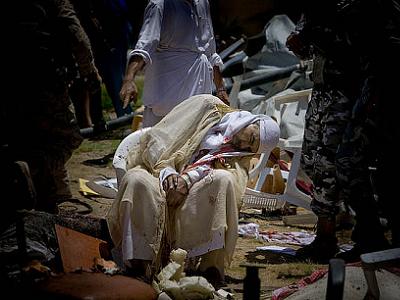Iraq War Declared Over, but War Party Persists

\'The tide of war is receding,\' said Obama. (Zoriah - zoriah.net)
By Ramzy Baroud
In a White House Statement on October 21, US President Barack Obama pledged that his country would finally withdraw forces from Iraq.
“After nearly nine years, America’s war in Iraq will be over,” he said.
Providing some context to Obama’s announcement, a CBSNews.com report published on the same day stated, “The war in Iraq has meant the death of more than 4,400 U.S. troops and come at a cost of more than $700 billion.”
The US media is now failing to process any facts aside from the losses suffered by the US, who wrought war and destruction on a country in urgent need of peace and humanitarian assistance. For over a decade prior to the war, Iraq was reeling under US-led UN sanctions, which left the country’s infrastructure in a state of near collapse.
In her introduction to Ramsey Clark’s important book, The Impact of Sanctions on Iraq: The Children Are Dying, Sara Flounders wrote, “Sanctions are a weapon of mass destruction. Since sanctions were imposed on Iraq, half a million children under the age of five have died of malnutrition and preventable diseases. Sanctions impose artificial famine. A third of Iraq’s surviving children today have stunted growth and nutritional deficiencies that will deform their shortened lives.”
In 1999, I was one of those who directly witnessed the impact of the sanctions on Iraqi children. I came back from the country with heaps of photos and memories that haunt me to this day. Oddly, enough, it was not sanctions as “a weapon of mass destruction” that inspired action to end the siege, but alleged Iraqi WMDs that invited another disaster to an already devastated nation.
It might take us years to truly understand the magnitude of what has since transpired in Iraq. Death and destruction have hovered over the country, killing and wounding hundreds of thousands, sending millions into exile and millions more have been classified by UN agencies as Internally Displaced Persons (IDP). It was a horror show that cannot be captured with the language of reason, but every moment of it was experienced by millions of ordinary people, punished severely for a crime they never committed.
The last US forces will depart the country by January 1 “with their heads held high, proud of their success,” according to Obama. This is the very president who, in a speech in Cairo on June 4, 2009, stated that “unlike Afghanistan, Iraq was a war of choice.” What is there to be proud of in a devastating war of choice, Mr. President?
Before the U.S. House of Representatives on January 18, 2007, now Republican candidate for president, Ron Paul fittingly remarked, “Clichés about supporting the troops are designed to distract us from failed policies, policies promoted by powerful special interests that benefit from war. Anything to steer the discussion away from the real reasons (for) the war in Iraq will not end anytime soon.”
But it is ending, simply because it was militarily unwinnable, financially unsustainable and politically indefensible. “Supporting the troops,” however, will continue to serve as an escape route for those who still refuse to discuss the Iraq war from a moral and legal viewpoint. For them, it is essential that the cover-up persists, so as not to deny the US the opportunity to instigate other wars of choice whenever suitable.
In a press briefing shortly following Obama’s end of war announcement, Antony Blinken, National Security Advisor to Vice President Joe Biden, remarked on whether the war was worth it. He answered, “history is going to have to judge.”
But Iraqis don’t need to wait for US history books to demonstrate to them the depth of their tragedy. The Lancet survey had already determined that between March 2003 and June 2006, 601,027 Iraqis died violent deaths. Opinion Research Business survey said that 1,033,000 died as a result of the conflict from March 2003 to August 2007. In one single revelation, WikiLeaks stated that “its release of nearly 400,000 classified U.S. files on the Iraq war showed 15,000 more Iraqi civilians died than previously thought” (Reuters, October 24, 2010).
Equally important is the fact that the violent mentality that insists on war – as opposed to diplomacy – to further US interests is still deeply rooted among US elites. Reporting from Washington, Jim Lobe wrote, “Key neo-conservatives and other right-wing hawks who championed the 2003 United States invasion of Iraq are calling for military strikes against Iran in retaliation for its purported murder-for-hire plot against the Saudi ambassador here” (Asia Times, October 19).
Blogging for Foreign Policy website on October 21, Dalia Dassa Kaye wrote, “The martial rhetoric from inveterate hawks was predictable. But even President Obama suggested that the United States would not take any ‘options off the table,’ a phrase that is understood to leave open military options.”
The rhetoric buildup for another conflict received a big boost during US Defence Secretary Leon Panetta’s first visit to Iraq since taking office on July 1. He said then that his country “will act ‘unilaterally’ to confront what he said were Iranian threats to US interests in Iraq.” The US was “very concerned about Iran and the weapons they are providing to extremists here in Iraq,” he said, as reported by Al Jazeera (July 11).
It will not be easy to reconcile Panetta’s comments with Obama’s end of war announcement which states that “Iraqis have taken full responsibility for their country’s security” and that the relationship between the US and Iraq will be that “between sovereign nations, an equal partnership based on mutual interest and mutual respect.”
There are no signs of the neoconservatives altering their views. The appetite for conflict also seems well and alive among Washington’s influential elites, who still brazenly propagate that the US war brought good to Iraqi society, despite all evidence to the contrary.
The official website for the US Forces in Iraq, USF-Iraq.com, is adorned by the following statement under the banner, The New Face of Iraq: “The nation of Iraq has undergone sweeping political, economical and social changes since the fall of Saddam Hussein’s regime. Elected officials are now in power, overseeing the continued development of security, infrastructure, education, security and finance.”
With that apparent ‘success’ in mind, the neocons can always advocate another military intervention or full scale invasion, whenever possible and affordable.
“The tide of war is receding,” said Obama. One has serious doubts.
– Ramzy Baroud (www.ramzybaroud.net) is an internationally-syndicated columnist and the editor of PalestineChronicle.com. His latest book is My Father Was a Freedom Fighter: Gaza’s Untold Story (Pluto Press, London), available on Amazon.com.










































0 Comments